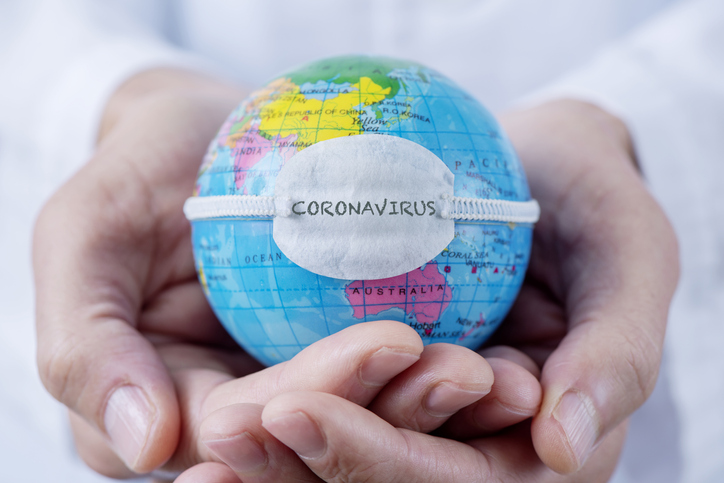Coronavirus: College of Podiatry and Royal College of Physicians and Surgeons of Glasgow guidance on steroid injections

Guidance on the safety of steroids injected as part of podiatric procedures during the current COVID-19 virus pandemic
Joint response of the College of Podiatry and the Faculty of Podiatric Medicine of the Royal College of Physicians and Surgeons of Glasgow: Guidance on the safety of steroids injected as part of podiatric procedures during the current COVID-19 virus pandemic
Introduction
Members may be concerned about the safety of using injected steroids for podiatric procedures during the current COVID-19 virus pandemic. This joint response provides information, guidance and recommendations, in the light of current knowledge.
Steroid use is common in podiatric procedures with the aim of easing pain, increasing mobility and quality of life. Their duration of effect is variable but can provide several months of benefit. The immunological impact of steroids given this way in patients with COVID-19 is unknown. As a result of the long quarantine period of an average of 14 days, there is also a risk that asymptomatic patients who are carrying the virus could be treated, potentially putting them at increased risk of an adverse outcome from the virus. There does appear to be higher risk patient groups, notably the elderly and those with comorbidities resulting in higher mortality rates.
Moreover, one must consider the risk of undertaking podiatric procedures in a hospital setting where they may be the risk of staff being exposed to potentially infected patients.
Use of steroids: possible impact in relation to COVID-19
The current WHO guidance 1for the management of severe acute respiratory infection in patients with COVID-19 is to avoid the routine use of systemic corticosteroids unless indicated for another reason. This is because steroids have been associated with an increased risk for mortality in patients with influenza and delayed viral clearance in patients with Middle East respiratory syndrome coronavirus (MERS-CoV) infection. Although they were widely used in the management of severe acute respiratory syndrome (SARS), there was no good evidence for benefit, and there was persuasive evidence of adverse short-and long-term harm 2. A recent study of patients with COVID in China reports that patients receiving corticosteroids did not have an effect on mortality, but rather delayed viral clearance 3.
Advice
Clearly, injections must not be undertaken in individuals with active infections. However, in addition, the potential arises to do harm to individuals who may be incubating or later develop COVID-19.
Long-acting, usually insoluble steroid formulations are frequently used in procedures to manage pain. To put this into context, Triamcinolone Acetonide 40mg is equivalent to ten times the normal daily physiological steroid production. Epidural steroids have been shown to cause a variable degree of adrenal suppression for at least some weeks 4. The potential impact of this immunological suppression in a patient incubating COVID at the time or in the future is unknown.
As with all podiatric procedures a risk-benefit balance has to be reached in discussion with the patient. Each case is unique and no guidance will cover all eventualities.
Caution should be used when assessing patients for steroid injections balancing the severity of underlying disease, the potential benefit and the risks including immunocompromise, underlying comorbidities and further risk should the patient have or become infected in the period after injection when there is likely to be an ongoing effect on the immunological system.
Patients should be fully aware of the potential increased risk, the lack of clear evidence and be engaged in decision making. Likewise, podiatrists should consider the risk and benefits of such injections and under which circumstances they will continue using them during the current clinical conditions.
The College of Podiatry and the Faculty of Podiatric Medicine of the Royal College of Physicians and Surgeons of Glasgow jointly recommend, on the balance of current evidence and risk, that podiatrists should avoid the use of corticosteroid injections and to seek to employ clinical alternatives, such as delaying administration of the injection or sodium hyaluronate, wherever possible.
The future
The situation relating to the pandemic is rapidly changing but it is thought that there will be several months of disruption and the potential for a significant proportion of the population to become infected.
National guidance should also be followed and will be updated on a regular, often daily basis.
Contact the College of Podiatry:Dr Paul Chadwick
Clinical Director, Clinical Leadership & Education
Direct Line: 020 7234 8628
Email: paul.chadwick@cop.org.uk
Contact the Faculty of Podiatric Medicine of the Royal College of Physicians and SurgeonsProfessor Robert Ashford
Faculty of Podiatric Medicine Dean
Direct Line: 0141 221 60 72
Notes:
1. Clinical management of severe acute respiratory infection when novel coronavirus (nCoV) infection is suspected. 2020 World Health Organization. WHO.https://www.who.int/docs/default-source/coronaviruse/clinical-management-of-novel-cov.pdf
2. Russell CD, Millar JE, Baillie JK. Clinical evidence does not support corticosteroid treatment for 2019-nCoV lung injury. Lancet 2020; 395:473.
3. Huang et al, Clinical features of patients infected with 2019 novel coronavirus in Wuhan, China www.thelancet.com Vol 395 February 15, 2020
4. Friedly J et al, Systemic effects of epidural steroid injections for spinal stenosis, Pain: May 2018, Vol 159, Issue 5, p876 -883
Download the full statement: Steroid injections and COVID-19
